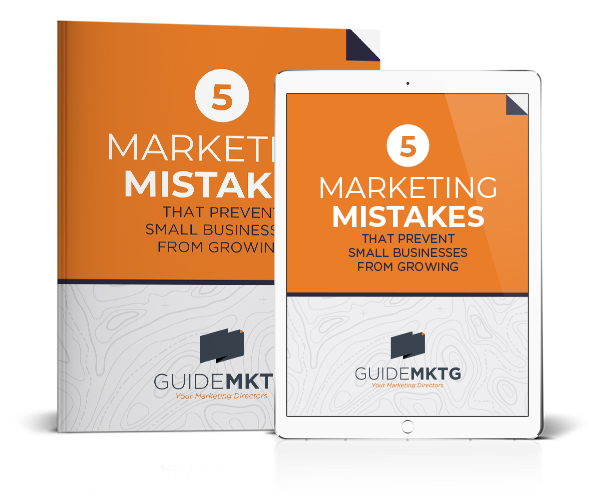Do you ever feel like there are 5 million different ways you could market your small business? Do you wish someone would just give you a clear, simple path toward growth? You’re in luck! Although there are way too many options when it comes to small business marketing, there are just 3 essential marketing actions you need to focus on to grow your business.
If you can commit to regularly completing one action from each category, you will keep your business going in the right direction.
The 3 Most Important Marketing Actions
In the sea of marketing actions you could take, stick to these three:
- Making data-driven decisions.
- Creating compelling content.
- Interacting intentionally with your audience.
Here’s why these three actions are so important:
Action #1: Make Data-Driven Decisions
Many small businesses avoid or ignore data.
Unfortunately, if your current marketing strategy depends more on your “gut feelings” or trial and error than cold-hard data, a good share of your marketing budget is probably going to waste.
Instead of wasting good money on bad marketing, commit an hour each week to gathering and analyzing marketing data. With data, you’ll be able to make sure every action you take is leading your company toward results.
Data is the backbone of any successful marketing strategy. Data can help you identify trends, determine which marketing strategies are driving the most sales, and help you see opportunities for improvement.
How to Gather Marketing Data
Although gathering marketing data takes some time initially, it will be worth the investment once you have a system set up. These digital tools can help make the data-gathering process easier:
Website
Google Search Console is a free tool that offers in-depth information about your website. You can find details about where website visitors are located, how long they’re staying on your website, and which pages they’re viewing.
You can also find which keywords people are using to find your website and where you rank in search engine results for those keywords.
Social Media
All social media platforms have analytics you can use to track engagement with posts. Reviewing these metrics regularly will help you determine what type of content, and even which social media platforms, attract the most potential customers to your business.
If you don’t want to log in to each platform to gather social media marketing data, a third-party tool like Hootsuite lets you see the analytics of all your social media profiles in one place.
Email
When you send email campaigns, your email management system collects data about how well that message performed. You can track the open rates and how many people reading the emails clicked on a link. You can also see where email subscribers are located and how they ended up on your email list.
How to Analyze Marketing Data
As you are gathering your data, consider putting it together in one place so you can see the health of your marketing efforts at a glance. Some people go the DIY route and use old fashioned spreadsheets while others use marketing analytics tools, like Google Analytics and Google Data Studio.
Once you have compiled your data, look for trends and patterns. For instance, if you notice that website visitors are spending a lot of time on your product page but not buying anything, that could mean that the copy of your product page needs some tweaks or maybe there is a problem with the user experience.
If you notice a spike in sales after a specific marketing campaign, you can confidently conclude that you ran a successful campaign worth repeating in the future.
If you see that one of your web pages is close to ranking on the first page of search engine results, you can use search engine optimization (SEO) to improve your ranking and bring more visitors to your website.
Data helps you create a marketing plan that drives you forward. You can clearly see which marketing efforts work and focus your time, and marketing budget, on the marketing activities that get results.
As you gather data, don’t fall into the trap of vanity metrics. Having hundreds of likes and comments on social media won’t automatically grow your business. You have to be able to turn those followers into customers. Stay focused on the numbers that directly grow your bottom line and your business.
Action #2: Create Compelling Content
We’ve all been told that content is king when it comes to digital marketing. However, that doesn’t mean you should mindlessly whip out mediocre content. You need content full of valuable information that resonates with your ideal customer. Relevant content answers questions your customers have and solves pieces of their pain points.
Good content marketing builds trust with potential customers. The goal is to create content that positions your company as an authority in your industry. When potential customers see that you know what you are talking about, they are more likely to trust, and ultimately buy, from you.
When it comes to content, there are a plethora of options (and this is where most small business owners get stuck).
Content can come in the form of written content like blog posts and emails, or audio content like videos and podcasts. Don’t try to do it all! Choose ONE type of content that you enjoy creating that also resonates with your audience and provides value. Then, commit to creating that type of content regularly.
To help you stay consistent, plan ahead. Use this simple method to brainstorm a year’s worth of content marketing ideas.
Action #3: Interact With Your Customers
Intentionally interacting with your customers online helps deepen the relationship you have with them. By responding to comments, answering questions, and addressing concerns, you show that you value your clients and are committed to providing excellent customer service.
Going above and beyond for your clients has the power to turn them into loyal customers that will stick around for years to come.
Interacting with potential customers also provides valuable insights into their needs and preferences, which can inform your marketing strategy and the future products or services that you offer.
At the same time, as your company grows, so will the number of people you have to interact with. To make sure that interacting with your customers doesn’t become the only thing you have time for, set aside a certain amount of time each week to reply to comments, customer feedback, reviews, emails, and questions.
If you find yourself answering the same questions over and over again, create content that thoroughly answers those questions so that you can simply send a link instead of a full explanation.
Having a series of templates you can quickly customize for your email and social media responses also helps save time while streamlining the process.
Time to Outsource Your Marketing Tasks?
If you don’t have time to analyze data, create compelling content, and interact with clients, then it is time to outsource. Consider hiring a customer service representative to help you keep up with the customer needs and a marketing expert to take over the data and content pieces.
If you need a marketing agency to take some of these essential marketing tasks off your to-do list, schedule a call with Guide MKTG. We can analyze the data for marketing campaigns we run and create compelling content that sparks interactions and increases sales.
Marketing can be overwhelming and time-consuming, but it doesn’t have to be. Stay focused on these 3 essential actions (or let someone else focus on them for you). With consistent implementation, you will be well on your way to growing your business and achieving your goals.





